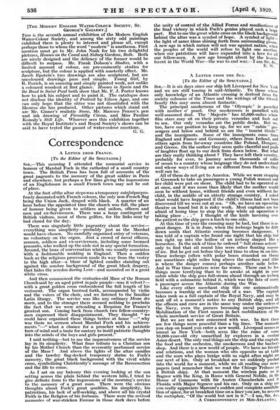Correspondence
A LEITER PROM FRANCE. [To the Editor of the SPECTATOR.] SIR,—This morning attended the memorial service in honour of Marshal Foch in the cathedral of a small country town. The British Press has been full of accounts of the great pageants to the memory of the great soldier in Paris and elsewhere, but perhaps a few lines giving the impressions of an Englishman 'in a small French town may not be out of place.
At the foot ofthe altar steps was a temporary catafalque pro- timely decorated with French colours, the only non-French flag being the :Union Jack, draped with black. A' quarter of an hour before the appointed time the church was full, the place of honour being given to soldiers and sailors, officers and men and ex-Servicemen. There was a large contingent of British visitors, most of them golfers, for the links near by had closed foi the day.
There was singularly little pageantry about the service— everything was simplicity—probably ,just as the Marshal would have chosen. No carefully organized entry of veterans, no voluntary. on the organ. Just a crowd of naval officers, seamen, soldiers and ex-servicemen, including some bronzed peasants, who walked up the aisle not in any special formation. Around; the buzz Of conversation which one usually associates with • a fashionable wedding in England. ' Then a sudden hush as the religious procession made its way from the vestry to the high altar—a blaze of lighted candles standing out against the sombre background of the great black, drapery, that hides the reredos during Lent—and mounted on it a great White cross.
And then conunenced the centuries-old Mass of the Roman Church said by an aged priest inpale purplevias it velvet?— with a great golden cross embroidered the full length of his vestment. The organ boomed forth, accompanied by violin and the voices of the choir, and we listened to the familiar Latin liturgy. The service was like any ordinary Messe des morts, and to the stranger-there seemed nothing to proclaim the fact that we were attending a Requiem for France's greatest son. Coming back from church two fellow-country- men expressed their disappointment. They thought " we could have organized these things better at home "—" why was there no sermon about Marshal Foch and his achieve- ments "-" what a chance for a preacher with a patriotic turn of mind and a taste for oratory to instil patriotic thoughts into the minds of the boys and girls present.,
I said nothing—but to me the impressiveness of the service lay in its simplicity. What finer tribute to a Christian son by his. Mother Church than the reverently performed service of the Mass ? And above the lights of the altar candles and the tawdry flag-decked temporary shrine to Foch's memory, the great black background with the vivid white cross, symbolizing Christianity's message of the Resurrection and the life to come.
As I sat on my balcony this evening looking at the sun setting across the plain behind the western hills, I tried to give definite form to the impressions of the morning's service to the memory of a great man. There were the obvious thOughts about Foch's great qualities, his Simplicity, his patriotism, his lack of self-seeking, and above all his crystal Faith in the Religion of hiS forbears: There were the revived memories of war-stricken Europe in those dark days before
the unity of control of the Allied Forces and recollections of the final victory in which Foch's genius played such a large part. But to me the great white cross on the black background behind the altar was a symbol of hope. A symbol of light-- the light of saner ideas shining forth from surrounding gloom. A new age in which nation will not war against nation, when the peoples of the world will refuse to fight one another, when our patriotism will have expanded into a love for all our fellow-men. A new age brought about by the lesSons learnt in the World War—the war to end war.—I am Sir, lee.,
E. W.






































 Previous page
Previous page